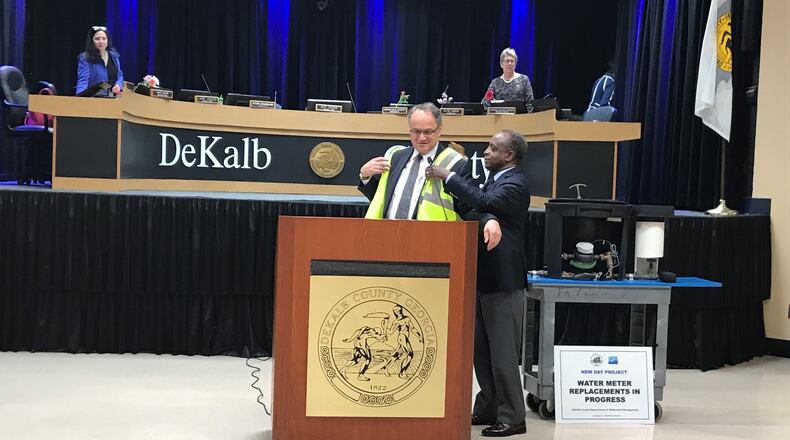DeKalb CEO Michael Thurmond said the county is taking a big step in solving its years-long problem with excessive and inaccurate water bills as it begins to replace half of the county’s residential water meters next month.
In all, the county will install 102,000 new meters over the next three years. Some 54,500 of the meters are being replaced because they are old, while another 47,500 are potentially defective. The first phase will begin in April as the county installs 30,000 new meters. The county has a total of 194,000 residential water customers.
The CEO talked during Tuesday’s county commission meeting about the program roll out and other efforts to combat the water billing issue, and he said the problems had worsened in recent decades.“I think the symbol of all of this 30 years’ worth of setbacks and disappointments: in 2016 we confirmed that about 50,000 of the meters that had been installed had a potential manufacturing mechanical defect,” Thurmond said. “That’s after they were in the ground.”
Thirteen percent of DeKalb water customers have seen their bills triple at least once, 25 percent had bills that doubled and 10 percent were billed four times their median bill, according to The Atlanta Journal-Constitution's 2017 analysis of water billing data. One customer even opened an August 2015 bill that said he owed $1.9 million.
The water meter exchange and upgrade program was made possible in part by an August 2018 settlement with the manufacturer of meters that had performance issues. That agreement is worth $8.64 million in equipment and labor.
The total cost of the project is $15.3 million. Individual customers will not be charged for the new meters.
The new meters will be equipped with transmitters that eliminate the need for workers to manually read consumption data every month prior to billing.
Unreliable equipment were just one of many contributing factors to the county’s issues, Thurmond said. He also blamed poor leadership at the county level, meters installed incorrectly and lack of institutional knowledge and training for employees tasked with reading meters.
In March 2018, the county finally eliminated a backlog of 37,000 water bills held for review after customers questioned their accuracy. Some residents had not received normal payment notices since December 2016.
Although the backlog was erased, Thurmond never said whether he would require customers to pay amounts owed while their bills were held. Thurmond released a statement Tuesday indicating he still hasn’t made a decision.
“My primary focus is on restoring the public trust not recouping any revenue that may be unaccounted for,” the statement said. “We are focused on installing new water meters and implementing a new state of the art billing system that will ensure customers receive accurate and timely water bills.”
About the Author
Keep Reading
The Latest
Featured


